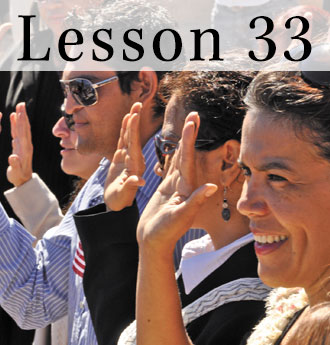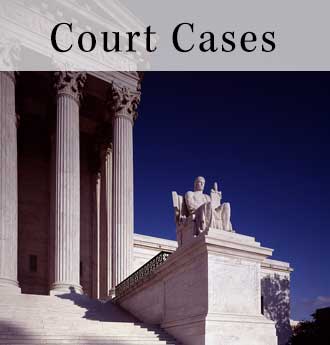Lesson 33: What Does It Mean to Be a Citizen?
The case summaries below were provided by Oyez and licensed under the Creative Commons Attribution-NonCommercial 4.0 International License. Please visit Oyez.org for more case summaries.
Worcester v. Georgia (1832)
Facts of the case:
In September 1831, Samuel A. Worcester and several others, all non-Native Americans, were indicted in the Gwinnett county supreme court in Georgia for "residing within the limits of the Cherokee nation without a license" and "without having taken the oath to support and defend the constitution and laws of the state of Georgia." They were indicted under an 1830 act of the Georgia legislature titled, "an act to prevent the exercise of assumed and arbitrary power by all persons, under pretext of authority from the Cherokee Indians." Worcester argued that the state could not maintain the prosecution because the statute violated the Constitution, treaties between the United States and the Cherokee nation, and an act of Congress titled, "an act to regulate trade and intercourse with the Indian tribes." Worcester was convicted and sentenced to "hard labour in the penitentiary for four years."
Case Question:
Does the state of Georgia have the authority to regulate interactions between citizens of its state and members of the Cherokee Nation?
Case Conclusion:
No. In an opinion delivered by Chief Justice John Marshall, the Court held that the Georgia act under which Worcester was prosecuted violated the Constitution, treaties, and laws of the United States. Noting that the "treaties and laws of the United States contemplate the Indian territory as completely separated from that of the states; and provide that all intercourse with them shall be carried on exclusively by the government of the union," Chief Justice Marshall argued, "The Cherokee nation, then, is a distinct community occupying its own territory in which the laws of Georgia can have no force. The whole intercourse between the United States and this nation, is, by our constitution and laws, vested in the government of the United States." The Georgia act thus interfered with the federal government's authority and was unconstitutional. Justice Henry Baldwin dissented for procedural reasons and on the merits.
Citation:
The Oyez Project, Worcester v. Georgia, 31 U.S. 515 (1832)
Link to case: https://www.oyez.org/cases/1789-1850/31us515
Minor v. Happersett (1874)
Facts of the case:
On October 15, 1872, Virginia Minor applied to register to vote in Missouri. The registrar, Reese Happersett, turned down the application, because the Missouri state constitution read: "Every male citizen of the United States shall be entitled to vote." Mrs. Minor sued in Missouri state court, claiming her rights were violated on the basis of the Fourteenth Amendment.
Case Question:
Does the Fourteenth Amendment protect the voting rights of women?
Case Conclusion:
No. In a unanimous opinion the court held that while women were citizens of the United States, and were, even prior to the passage of the Fourteenth Amendment, voting rights were not a "necessary privilege and immunity" to which all citizens are entitled.
Citation:
88 U.S. 162 (Wall.)
Link to case: http://caselaw.findlaw.com/us-supreme-court/88/162.html
Wong Wing v. United States (1896)
Facts of the case:
The Chinese Exclusion Act imposed imprisonment at hard labor and deportation to Chinese persons convicted of unlawful entry to or presence in the United States. Wong Wing was charged under the act. A commissioner of the circuit court (who was not a judge) found that Wong Wing was an unlawful alien and sentenced him to 60 days at hard labor followed by deportation to China. Wong Wing sought a writ of habeas corpus, but it was denied. He appealed to the Supreme Court.
Case Question:
Does penalty of imprisonment at hard labor and deportation without a jury trial constitute a violation of the Fifth and Sixth Amendments?
Case Conclusion:
Yes; consequently, the imprisonment provisions of the act are void. Congress may deport without a jury trial, but imprisonment at hard labor is an infamous offense calling for judicial trial to establish the guilt of the accused. "It is not consistent with our theory of government that the legislature should, after having defined an offense as an infamous crime, find the fact of guilt and adjudge the punishment by one of its own agents."
Citation:
The Oyez Project, Wong Wing v. United States, 163 U.S. 228 (1896)
Link to case: https://www.oyez.org/cases/1850-1900/163us228
United States v. Wong Kim Ark (1898)
Facts of the case:
The Chinese Exclusion Acts denied citizenship to Chinese immigrants. Moreover, by treaty no Chinese subject in the United States could become a naturalized citizen. Wong Kim Ark was born in San Francisco. At age 21, he returned to China to visit his parents who had previously resided in the United States for 20 years. When he returned to the United States, Wong was denied entry on the ground that he was not a citizen.
Case Question:
Could the government deny naturalization to persons born in the United States in violation of the Fourteenth Amendment?
Case Conclusion:
No. The government could not deny naturalization to anyone born in the United States. To reach this conclusion, Justice Gray's tedious majority opinion managed to traverse much of western civilization.
Citation:
The Oyez Project, United States v. Wong Kim Ark, 169 U.S. 649 (1898)
Link to case: https://www.oyez.org/cases/1850-1900/169us649
Trop v. Dulles (1958)
Facts of the case:
In 1944, United States Army private Albert Trop escaped from a military stockade at Casablanca, Morocco, following his confinement for a disciplinary violation. A day later, Trop willingly surrendered to an army truck headed back to Casablanca. Despite testifying that he "decided to return to the stockade" when he was picked up, a general court martial convicted Trop of desertion and sentenced him to three years at hard labor, loss of all pay and allowances, and a dishonorable discharge. In 1952, Trop applied for a passport. His application was rejected under Section 401(g) of the amended 1940 Nationality Act, on the ground that he lost his citizenship due to his conviction and dishonorable discharge for wartime desertion. After failing to obtain a declaratory judgment that he was a U.S. citizen, from both a district and the Second Circuit Court of Appeals, Trop appealed to the Supreme Court.
Case Question:
Did Section 401(g) of the amended 1940 Nationality Act (the "Act") allow for an unconstitutional punishment by authorizing the expatriation of a citizen convicted of wartime desertion?
Case Conclusion:
Yes. After finding that Section 401(g) of the amended Act was penal in nature, since it punished convicted deserters with denationalization, the Court held that involuntary expatriation was barred by the Eighth Amendment as a cruel and unusual penal remedy. Citizenship, the Court stated, is not a license that expires upon misbehavior. Rather, it can only be voluntarily renounced by express language and, or, conduct. Since Trop did not involve himself in any way with a foreign state, so as to demonstrate disloyalty to the United States, his court martial conviction of desertion did not justify his forced expatriation.
Citation:
The Oyez Project, Trop v. Dulles, 356 U.S. 86 (1958)
Link to case: http://oyez.org/cases/1950-1959/1956/1956_70
Kent v. Dulles (1958)
Facts of the case:
Rockwell Kent applied for and was refused a passport to visit England. In addition to informing him that his application refusal rested on his Communist Party affiliations, the Passport Office director told Kent that in order for a passport to be issued a hearing would be necessary. The director instructed Kent to submit an affidavit as to whether he was a current or past Communist. Upon the advice of his lawyer, Kent refused to sign the affidavit but did participate in a hearing at which he was once more asked to sign an affidavit concerning his Communist affiliations. When he refused the affidavit, the Passport Department advised Kent that no further action would be taken on his passport request until he satisfied the affidavit requirement. On appeal from consecutive adverse rulings in both district and appellate court, the Supreme Court agreed to hear Kent's case.
Case Question:
Could the executive branch's Passport Department defer or refuse the issuance of passports to individuals suspected of being Communists or of traveling abroad to further Communist causes?
Case Conclusion:
No. In a 5-to-4 decision, the Court held that the right to travel is an inherent element of "liberty" that cannot be denied to American citizens. Although the Executive may regulate the travel practices of citizens, by requiring them to obtain valid passports, it may not condition the fulfillment of such requirements with the imposition of rules that abridge basic constitutional notions of liberty, assembly, association, and personal autonomy.
Citation:
The Oyez Project, Kent v. Dulles, 357 U.S. 116 (1958)
Link to case: http://oyez.org/cases/1950-1959/1957/1957_481
Plyler v. Doe (1982)
Facts of the case:
A revision to the Texas education laws in 1975 allowed the state to withhold from local school districts state funds for educating children of illegal aliens. This case was decided together with Texas v. Certain Named and Unnamed Alien Child.
Case Question:
Did the law violate the equal protection clause of the Fourteenth Amendment?
Case Conclusion:
Yes. The Court reasoned that illegal aliens and their children, though not citizens of the United States or Texas, are people "in any ordinary sense of the term" and, therefore, are afforded Fourteenth Amendment protections. Since the state law severely disadvantaged the children of illegal aliens, by denying them the right to an education, and because Texas could not prove that the regulation was needed to serve a "compelling state interest," the Court struck down the law.
Citation:
The Oyez Project, Plyler v. Doe, 457 U.S. 202 (1982)
Link to case: http://oyez.org/cases/1980-1989/1981/1981_80_1538
Crawford v. Marion County Election Board (2008)
Facts of the case:
In 2005, the Indiana legislature passed a law requiring all voters who cast a ballot in person to present a photo I.D. issued by the United States or the state of Indiana. Plaintiffs including the local Democratic Party and interest groups representing minority and elderly citizens argued that the law constituted an undue burden on the right to vote. At trial, the plaintiffs did not produce any witnesses who claimed they would be unable to meet the law's requirements. The district court and the court of appeals both upheld the law. However, the three-judge appellate panel was deeply divided. Dissenting judge Terrence Evans claimed that the law was a thinly-veiled attempt to dampen turnout by those likely to vote for Democratic candidates.
Case Question:
Does a law that requires voters to present either a state or federal photo identification unduly burden citizens? right to vote?
Case Conclusion:
No. By 6-3 vote, the Court upheld the law, concluding that the photo I.D. requirement was closely related to Indiana's legitimate state interests in preventing voter fraud. The slight burden the law imposed on voters' rights did not outweigh these interests, which the Court characterized as "neutral and nondiscriminatory." Although there was no majority opinion, the Court's decision included concurring opinions written by Justices John Paul Stevens and Antonin Scalia. Justices David Souter and Stephen Breyer each wrote dissenting opinions. Justice Ruth Bader Ginsburg joined Justice Souter's dissent.
Citation:
The Oyez Project, Crawford v. Marion County Election Board, 553 U.S. ___ (2008)
Link to case: http://oyez.org/cases/2000-2009/2007/2007_07_21







